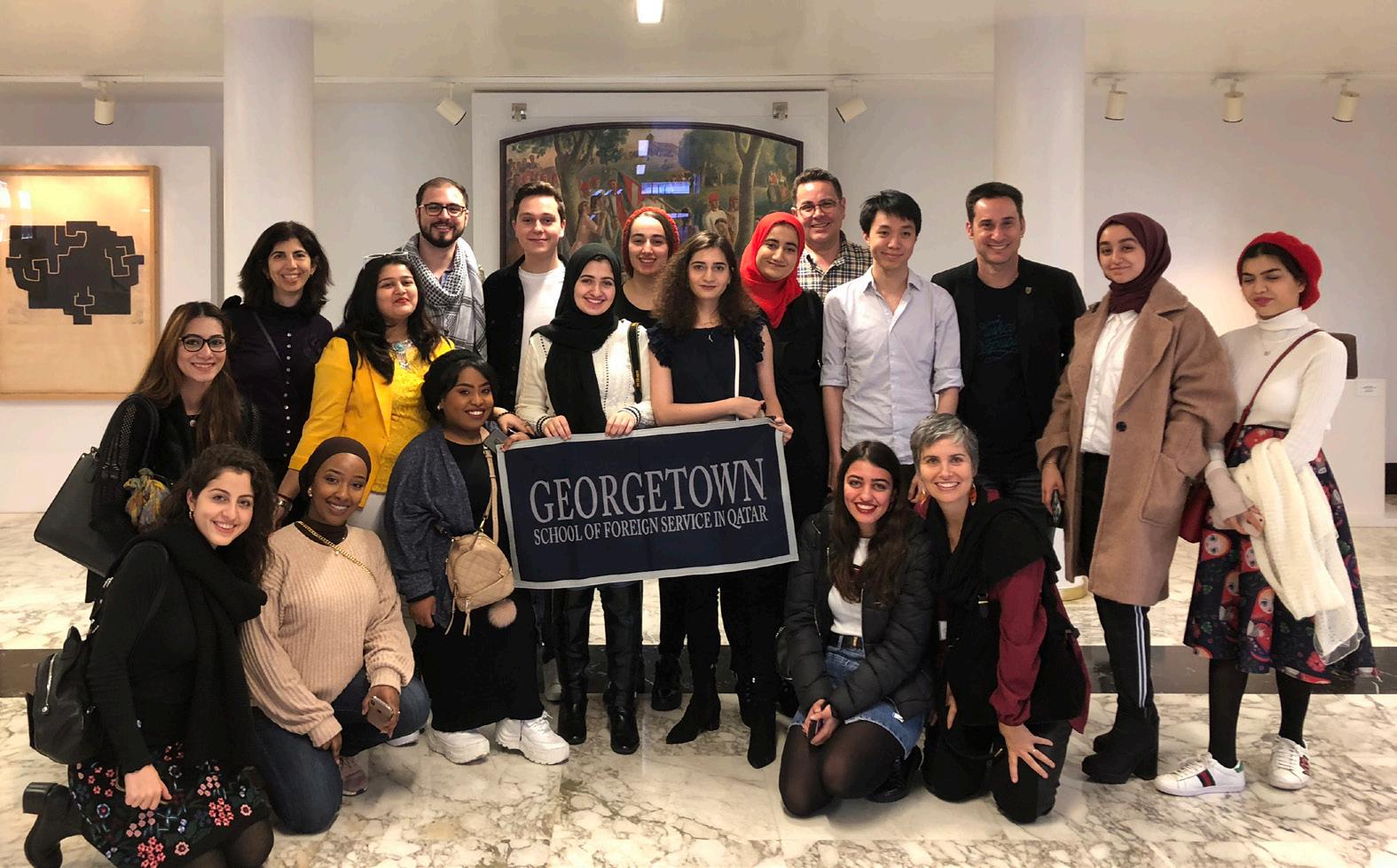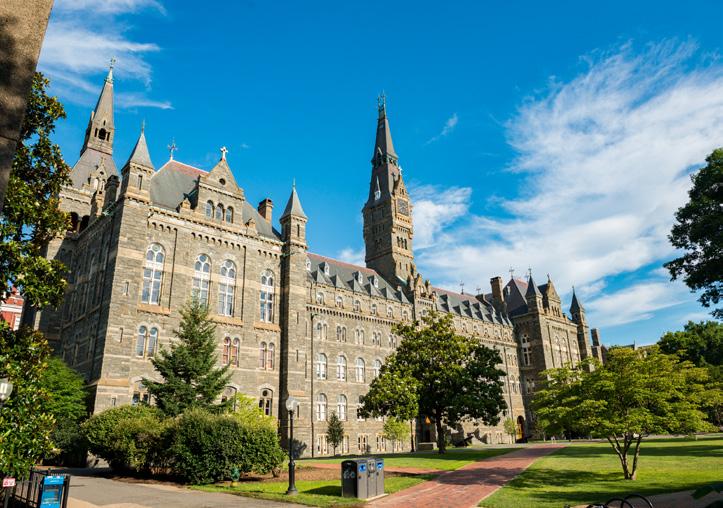
5 minute read
Experiential Learning
The International Negotiation Simulation is a hands-on experiential learning activity that gives our students an understanding about what it takes to bring people with very different views to the table to resolve a conflict. These are critical life skills no matter which career path they pursue.
—Christine Schiwietz, Assistant Dean for Academic Affairs
28
students participated in the International Negotiation and Crisis Simulation exercise
CO-CURRICULAR PROGRAMS
Students are offered several co-curricular experiential learning opportunities, both with and without academic credit, which complement the core curriculum.
INTERNATIONAL NEGOTIATION & CRISIS SIMULATION The International Negotiation and Crisis Simulation includes a one-credit course that engages students in the study of diplomacy by combining theory and practice. The annual simulation, organized in conjunction with the Institute for the Study of Diplomacy (ISD) at Georgetown University, gives students the opportunity to improve their negotiation, decision-making, and crisis management skills.
Students learn ways to leverage hard and soft power during negotiations with state and non-state actors, to find shared interests between negotiating parties, to successfully prioritize their own interests, and to identify ways in which proxies are used to influence external powers. This year, the week-long simulation tackled “Syria: Seeking a Final Settlement of the Conflict,” and featured the participation of Roland McKay, Rusk Fellow at ISD and career Foreign Service Officer with the U.S. Department of State.
MODEL UNITED NATIONS (MUN) MUN provides students with an opportunity to gain insight into the world of international politics and decision-making.
MUN STUDENT BOARD MEMBERS LEARN TO: • Research and engage in discussions about current events • Engage with the local and wider community • Organize, plan, and execute large international conferences • Teach complicated and emotionally-involved topics to high school students • Advise high school students and teach them ways to prepare for the event
This year, H.E. Hassan Al Thawadi, Secretary General of the Supreme Committee for Delivery and Legacy, delivered the keynote speech at the MUN opening ceremony. Held under the theme “Diversity and Integration in a World of Conflict,” the 14th Annual Conference tackled topics such as the persecution of Muslim minorities, education in post-conflict zones, civil war in South Sudan, and nuclear proliferation. Attended by more than 350 student participants, the conference included delegates from Bosnia and Herzegovina, Ghana, Indonesia, Morocco, Nigeria, Turkey, and other nations.
354 student participants attended the 2018 MUN Conference
60 GU-Q students organized the 14th MUN Conference
F i z a S h a h z a d , S F S ’ 2 1

ZONES OF CONFLICT, ZONES OF PEACE (ZCZP) This award-winning three-credit course takes students to zones of ethnic, political, religious, and social conflict, to help students understand the causes of the conflict and to learn about the difficult process of reconciliation. One- to two-week ZCZP trips involve meetings with politicians, journalists, community organizers, and other change-makers in the destination zone, as well as visits to points of historical interest.
This year’s cohort traveled to the Basque Country, an autonomous community in Spain, to examine the Spain–Euskadi Ta Askatasuna (ETA) conflict—an armed political conflict which took place between 1959 and 2011—and the peace-building strategies that have been used to address the memory of violence.
COMMUNITY ENGAGEMENT PROGRAM (CEP) Through the combination of traditional academics and field experience, CEP initiatives address the needs and issues affecting local and international communities. This year, the three-credit course explored the politics of development in the Indian subcontinent, giving students a better understanding of poverty, deprivation, and inequalities across the region.
The travel component of ZCZP is essential to the learning process. We meet activists, and politicians, as well as victims who embody the conflict and their testimonies bring everything home.
—Mohammed Abu Hawash (SFS’19)
MEDIA & POLITICS
39 students cross-registered this year as they worked on earning a Certificate in Media & Politics
STUDY ABROAD & CROSS -REGISTRATION GU-Q students are encouraged to participate in both the study abroad and cross-registration programs during their academic career. In so doing, they are exposed to different ideas, values, people, and cultures.


A b d u l l a A l M a l k i , S F S ’ 2 1
18
HBKU students enrolled in Arabic classes at GU-Q through cross-registration STUDY ABROAD GU-Q students can study abroad in Washington, DC, or at one of the 100+ programs around the world. The summer after their first year at GU-Q, students can choose to study abroad for a semester or for a full academic year.
This year a total of 14 GU-Q students studied overseas and 3 students—from Brown, Yale and Georgetown University— were welcomed to the GU-Q campus in Qatar.
18
students in the Academic Bridge Program took a course on government at GU-Q through cross-registration GU-Q STUDENT STUDY ABROAD PARTICIPANTS:
Georgetown University ........................ 7 London School of Economics ............... 2 National University of Singapore .......... 1 University of Edinburgh ....................... 4 CROSS -REGISTRATION Undergraduate students who are enrolled at one of the universities in Education City can register for courses offered at any of the other Education City universities through the cross-registration program.
This year 75 students took classes at GU-Q and 53 GU-Q students attended classes at other universities in Education City, including CMU-Q, NU-Q, TAMU-Q, and VCUarts Qatar.
GU-Q CROSS-REGISTRATION PARTICIPANTS:
Carnegie Mellon University in Qatar.... 14 Northwestern University in Qatar........ 30 Texas A&M University at Qatar ............. 3 VCUarts Qatar..................................... 6
LEADERSHIP TRACK The Hoya Leadership Track, formerly known as the Hoya Leadership Pathway, encourages and recognizes student engagement and leadership through co-curricular programming that builds on Georgetown values:
• Ad Majorem Dei Gloriam • Contemplation in Action • Academic Excellence • Educating the Whole Person • Cura Personalis • Faith and Justice • Women and Men for Others • Interreligious Understanding • Community in Diversity
4students earned a Hoya Leadership Pathway medal
9students received student development awards
STUDENT DEVELOPMENT AWARDS 2019 Each year the Student Development team recognizes
exceptional seniors who have contributed to the GU-Q community through the embodiment of the Hoya spirit, club leadership, and service.
AMBASS ADOR AWARD ............................Asma AlJehani
CURA PROGRAM FELLOWSHIPS The CIRS Undergraduate Research Advancement (CURA) program offers annual fellowships for GU-Q students. Through training and practical application, students gain skills related to academic publishing, as well as research methods, administration, and organization.
For a full list of this year’s CURA programming see page 23.
ACADEMIC INTERNSHIPS & WORK STUDY Non-credit and for-credit internships and university work experience are opportunities available to all students. Both internships and academic study enable students to apply theoretical knowledge in a professional setting.
For a full list of 2018-2019 student internship participants see page 97. BLUE & GRAY AWARD ................... Katharine Danilowicz
COMMUNITY IN DIVERSITY AWARD ....................Sameera AlHaj Abed
ENGAGEMENT AWARD .......................... Zaubash Shakir
HOYA LEADERSHIP PATHWAY: GOLD MEDAL WINNERS
.......................... Ameni Abida ..................... Rafia Al-Jassim .................... Normeanne Sison ............................Zaubash Shakir
LEADERSHIP AWARD ............................. Dialla Jandali










